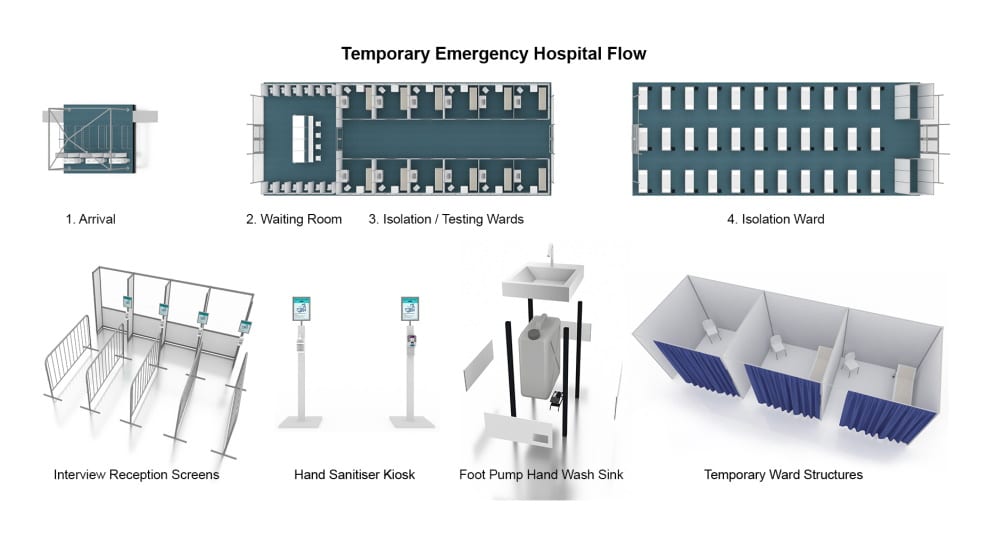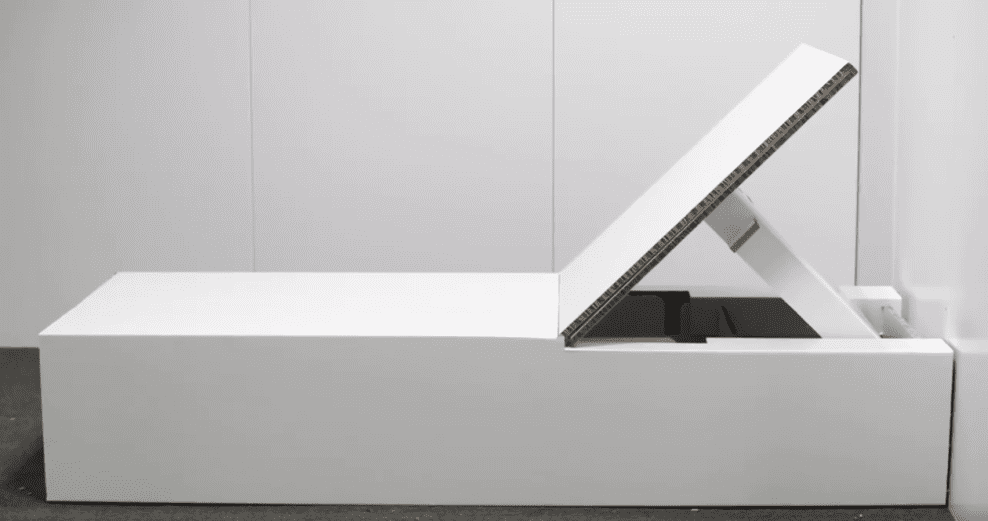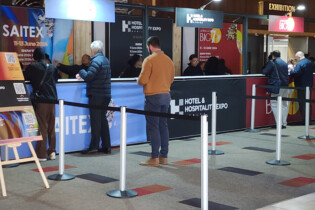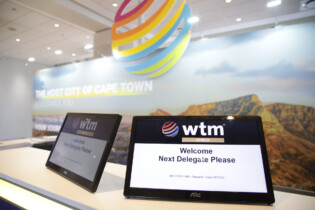Pivoting from corporate gigs to humanitarian relief
One bold example of this is exhibition organisers African Oil & Power (AOP) and exhibition architects Hott3D, who together have founded a not-for-profit collaborative project called Afrika Umoja.
Liam Beatie, the MD of Hott3D and a co-founder of Afrika Umoja, says, “The AOP team organise excellent government-level events in challenging environments. We deliver the infrastructure for those events. It’s a short leap to being able to do what is needed to create temporary spaces for medical experts to work within.”

He goes on to explain that Afrika Umoja, which is Swahili for ‘Africa United’, will “drive funding in order to provide the base infrastructure that medical interventions and relief efforts are going to need within Africa”. These could be anything from screening centres to isolation centres, intensive care facilities, and temporary housing solutions.
“Afrika Umoja allows for a branded marketing platform and a leverage system to bring everything needed together in a coherent and organised manner.”
Katie Brock, the Director of Afrika Umoja, adds that this event industry-led initiative is encouraging collaboration between as many suppliers as possible, to broaden the scope of what can be provided, and to utilise as many in-country resources as possible to help their economies. “Our industry, and other industries, are filled with excellent people who do great work and are able to play a role in this. Afrika Umoja allows for a branded marketing platform and a leverage system to bring everything needed together in a coherent and organised manner,” she says.

Because of the possible scale of the project, the team are deep in discussions with many role players including governments, partner organisations, corporates, funding agencies and fellow suppliers. Should you want to find out more, and contribute to the project in some way, please visit hott.co.za/afrika-umoja.
Solving the supply problem for hospital beds
Another major challenge when mobilising a rapid emergency response effort is the need for large quantities of supplies quickly and affordably – and often at a rate outpacing supply. One such necessity is hospital beds.
Recognising this need, Xanita worked with their US distribution partners Mohawk Paper to design a basic hospital bed out of their product, Xanita board. They have since adapted the design slightly for the South African market, with their local distribution partners Intamarket and Intamed.
“Although it is made from paper, this engineered board is incredibly strong with a crush strength of 60 ton/m².”
Although it is made from paper, this engineered board is incredibly strong with a crush strength of 60 ton/m². This means a cubic meter of the product can withstand up to 60 tons of pressure.

Rowan Maher, the CMO of Xanita, explains that the beds have many characteristics that are ideal for this scenario. For example, they are inexpensive to produce and can be manufactured quickly (both the board and bed design). And because of the modular design of the beds, they can be assembled within minutes and without any tools.
The modular design also allows the beds to be flat-packed. This, and their lightweight properties, helps to keep transport-related costs low.
“To dispose of Xanita board products, we usually reuse or recycle them,” says Maher. “But in this instance incineration is recommended, especially as the board is non-toxic and has no VOCs.”
“The solution is designed to rapidly scale up much needed temporary hospital bed capacity as cost effectively as possible using existing infrastructure, basically large open indoor venues such as exhibition halls, conference rooms, community centers, arenas and school halls.”
Xanita is also producing temporary walling partitions, to help isolate patients. Maher explains, “The solution is designed to rapidly scale up much needed temporary hospital bed capacity as cost effectively as possible using existing infrastructure, basically large open indoor venues such as exhibition halls, conference rooms, community centers, arenas and school halls. The walling solution is modular and these spaces can be transformed within a matter of hours.”
Ubuntu: I am because we are
While hospitals need more beds, the hospitality sector has an abundance of empty ones.
When Kim Whitaker returned home to South Africa from Germany and tested positive for coronavirus six weeks ago, she went into self-quarantine. During this time she heard Dr Jakob Zwaan, an Italian doctor who was working in a region in Italy hardest hit by COVID-19, say that if he could go back three weeks in time he would have arranged accommodation for the doctors and nurses in the now-closed hotels. This idea resonated with Whitaker, as she owns two hotels – Once in Cape Town and Once in Johannesburg – that were standing empty at the time.
“A great risk for healthcare workers globally is the commute to and from the hospitals after their shifts, and the fear of bringing the virus home to family and loved ones. By pairing healthcare workers who are fighting the virus on the front lines with convenient accommodation, we can better look after them.”
“A great risk for healthcare workers globally is the commute to and from the hospitals after their shifts, and the fear of bringing the virus home to family and loved ones. By pairing healthcare workers who are fighting the virus on the front lines with convenient accommodation, we can better look after them,” she explains.

She quickly realized that hospitals were being inundated with offers for help and were not equipped to manage these effectively. “So I set up Ubuntu Beds as an online platform that can directly connect interested healthcare workers with available accommodation,” she says. “Any hostels, hotels, BnBs and guest-houses which have been hit by travel bans and lockdown and want to offer safe harbour to our doctors and nurses can apply.”
Many properties are offering rooms at no cost, or for hugely discounted rates of R100 to R400 a night. She explains that this is not enough to make a profit, but in many cases it is enough to help support a small staff compliment, and help properties keep their staff.
“Thus far, 400 accommodation properties and 300 healthcare workers have signed up, and we have already housed 15 healthcare workers.”
The range of accommodation being offered on Ubuntu Beds varies, from the City Lodge Hotel Group and Soweto Hotel & Conference Centre, to The Peech Hotel, The B.I.G (Backpackers in Green Point), and various Airbnb properties and vacant private homes.
“Thus far, 400 accommodation properties and 300 healthcare workers have signed up, and we have already housed 15 healthcare workers,” she adds.
If you would like to offer accommodation or funding for this project, or are an essential worker who would like to use this service, visit ubuntubeds.org to sign up.







